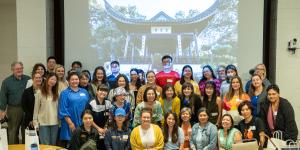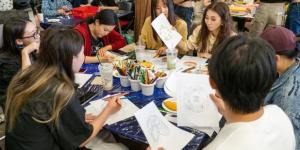On September 29, 2024, the USC U.S.-China Institute hosted a workshop at the Huntington’s Chinese garden, offering K-12 educators hands-on insights into using the garden as a teaching tool. With expert presentations, a guided tour, and new resources, the event explored how Chinese gardens' rich history and cultural significance can be integrated into classrooms. Interested in learning more? Click below for details on the workshop and upcoming programs for educators.
Nixon in China
An Opera by John Adams.
Where

John Adams’ Nixon in China is a landmark of contemporary opera. The world changed with President Nixon’s 1972 visit to China and the walls between East and West began to crumble. This profound historical event becomes a mesmerizing drama filled with riveting music, striking choruses, and stunning ballets. The political and private lives of Richard Nixon, Chairman Mao, Henry Kissinger, and Pat Nixon set the stage for this masterpiece by the most performed living American composer.
“It is part epic, part satire, part a parody of political posturing, and part serious examination of historical, philosophical, and even gender issues.” (John Adams)
Synopsis
ACT 1
At an airfield outside Beijing, on February 21, 1972, a chorus of Chinese soldiers sing a choral introduction. Richard Nixon's plane, the Spirit of '76, arrives; Nixon is greeted by Choi En-Lai; during the introductions, Nixon reflects on the historical nature of his journey and the way it will be perceived by the American media ("News has a kind of mystery").
Later, Nixon and Henry Kissinger meet with Chairmain Mao. Mao, his words endlessly repeated by his three secretaries, discusses political theory and the upcoming American elections. When Nixon mentions Confucius, Mao explains his vision of modern China ("We no longer need Confucius").
At a banquet in honor of the Americans, Premier Chou and President Nixon in turn give formal toasts, which become less formal as the evening goes on ("Ladies and gentlemen, comrades and friends"/"Mr. Premier, distinguished guests").
ACT 2
Pat Nixon is taken on a carefully choreographed publicity tour of factories, sights and public buildings. She reflects on the China she has been shown, as compared to the past and future of the United States ("This is prophetic").
The Nixons attend a performance of Madame Mao's ballet, The Red Detachment of Women. During the performance, Pat Nixon is drawn into the action of the play, and the villain of the piece appears to be played by Henry Kissinger. The performance ends with a defiant aria by Madame Mao herself ("I am the wife of Mao Tse-Tung").
ACT 3
On the last night of the visit, the Nixons, Mao, and Chou reflect on the personal histories that have led them to this point, includig Nixon's war service and the Long March. As the opera ends, Chou reflects on the historical nature of the past few days ("I am old and I cannot sleep").
***
John Adams has harnessed the rhythmic energy of Minimalism to the harmonies and orchestral colours of late-Romanticism . He brought contemporary history to the opera house with his post-modern music-theatre works Nixon in China (1987) and The Death of Klinghoffer (1991) and lately Doctor Atmonic (2005). Has addressed urgent social issues with passion and empathy, both in his operas and in such works as I Was Looking at the Ceiling and then I Saw the Sky, El Dorado and The Wound-Dresser. His works are much favoured by choreographers, with multiple ballet versions of Fearful Symmetries. He is the winner of the 1995 Grawemeyer Award for Violin Concerto. Adams has a series of recordings on the Nonesuch label. A recent survey shows him to be the most frequently performed living American composer of orchestral music. Adams joins the Los Angeles Philharmonic in the new position of Creative Chair, beginning with the world premiere of City Noir Oct 8.,2009
Click HERE to purchase tickets.
Featured Articles
Events
Ready to level up your Chinese language skills with some fun? Join us for Things Not Taught in Class: Chinese Board Games!
Please join us for the Grad Mixer! Hosted by USC Annenberg Office of International Affairs, Enjoy food, drink and conversation with fellow students across USC Annenberg.





